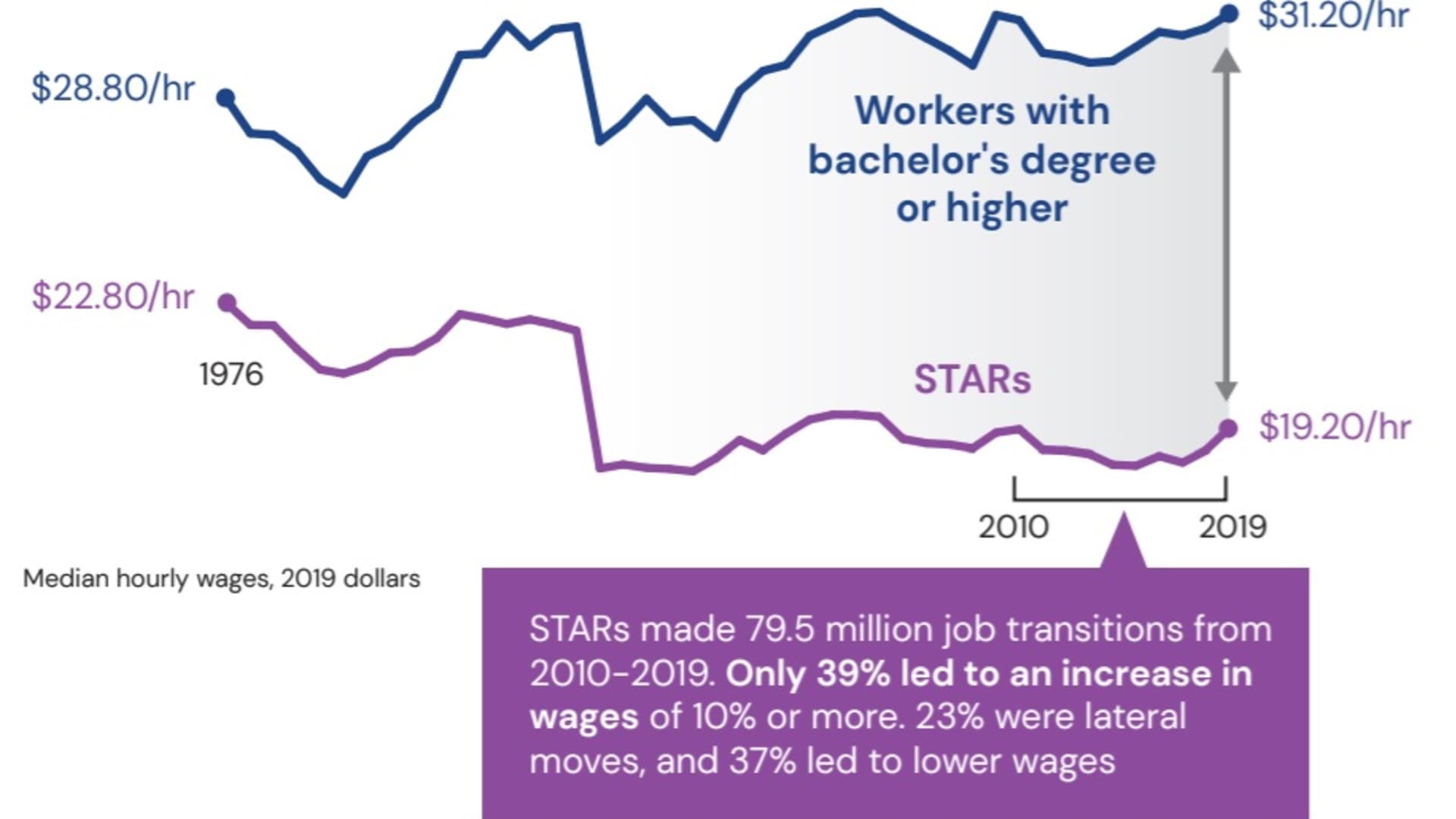
College graduates significantly out-earn those without an advanced degree. The Bureau of Labor Statistics estimates that American workers with a bachelor's degree make $1,248 per week on average while workers with just a high school degree earn closer to $746 per week on average.
But according to a new report conducted by McKinsey and nonprofit Opportunity@Work, as many as 30 million U.S. workers without college diplomas have the skills necessary to earn 70% more. Often, the report claims, employer education requirements hold these workers back.
The report calls these workers "STARs" for "skilled through alternative routes" such as tech bootcamps, community college programs, workforce training, on-the-job skills building and military service. They found that in 2019, the wage gap between those with a bachelor's degree and STARs was roughly $31.20 per hour versus $19.20 per hour.
For the report, researchers analyzed over 130 million job transitions made by workers and determined that STARs were less likely to earn more after job transitions than their college-educated counterparts. For instance, of the 79.5 million job transitions that STARs made from 2010-2019, only 39% led to an increase in wages of 10% or more.
And among STARs, Black, Hispanic and women workers were less likely to transition to higher-paying roles.

Jose Ortiz Jr., CEO of the NYC Employment and Training Coalition, the largest city-based workforce development system in the country, says the detailed mapping done by the report is "promising and exciting for folks in the workforce development sector who have been advocating for things of this nature for some time."
Money Report
Ortiz stressed that not only is providing a pathway to skills training and higher wages the right thing to do for underserved communities, it is also beneficial for the U.S. economy.
"It goes beyond it being a moral imperative. It is an economic imperative in order to ensure that the economy remains strong," he says. "Our country will continue to attract some of the best talent in the world and we can continue to do so to some degree, but in order to remain economically viable, we also have to ensure that our folks, our residents, our citizens are also viable talent as well."
Over the past 20 years, U.S. labor force participation and employment rates have declined faster than they have in any other country that is part of the Organization for Economic Cooperation. This declining labor force worries Ortiz.
"The economic imperative this presents is that we will continue to have a declining workforce here in the States if we are not doing the necessary work from a K-16 perspective, from a workforce development perspective, in order to remain competitive," he says.
And while the coronavirus pandemic has undoubtedly exacerbated the challenges facing low-wage workers, people like Anant Agarwal, founder and CEO of online learning platform edX, are optimistic that the pandemic will make employers more open to hiring STARs with non-traditional training such as online credentials and tech bootcamps.
"We were seeing increasing interest from companies even before the pandemic," he says, listing IBM and Walmart as examples of companies that have invested in non-traditional workforce training and noting that many high-profile companies have begun shifting away from requiring employees have college degrees. "And after the pandemic, I think you'll see a lot more interest."
Agarwal predicts that in the future, 50% of all learning — including among students at traditional colleges — will take place online, consequentially breaking the stigma against it.
Ultimately, Ortiz says investing in non-traditional skills training will be an essential part of the country's economic recovery.
"Now is the time to double down on reskilling, addressing those skills that are needed to get folks into middle-skill jobs that are going to allow for them to have significantly higher wages," says Ortiz. "And I don't think there is a better time than ever before for us to really be considering the role that workforce development can play into that, given the fact that we have millions more unemployed than we did than we did this time last year."
Don't miss:






